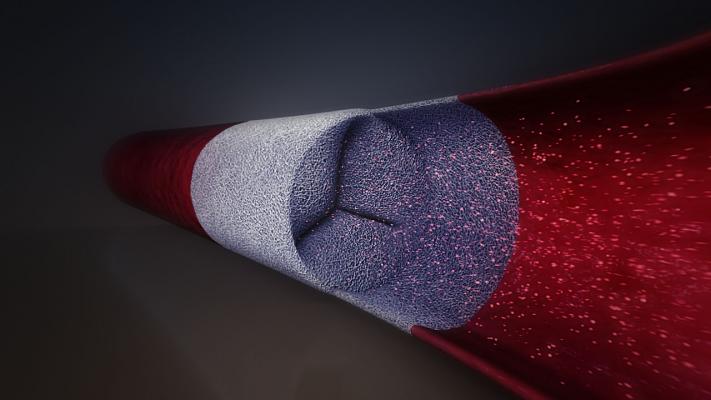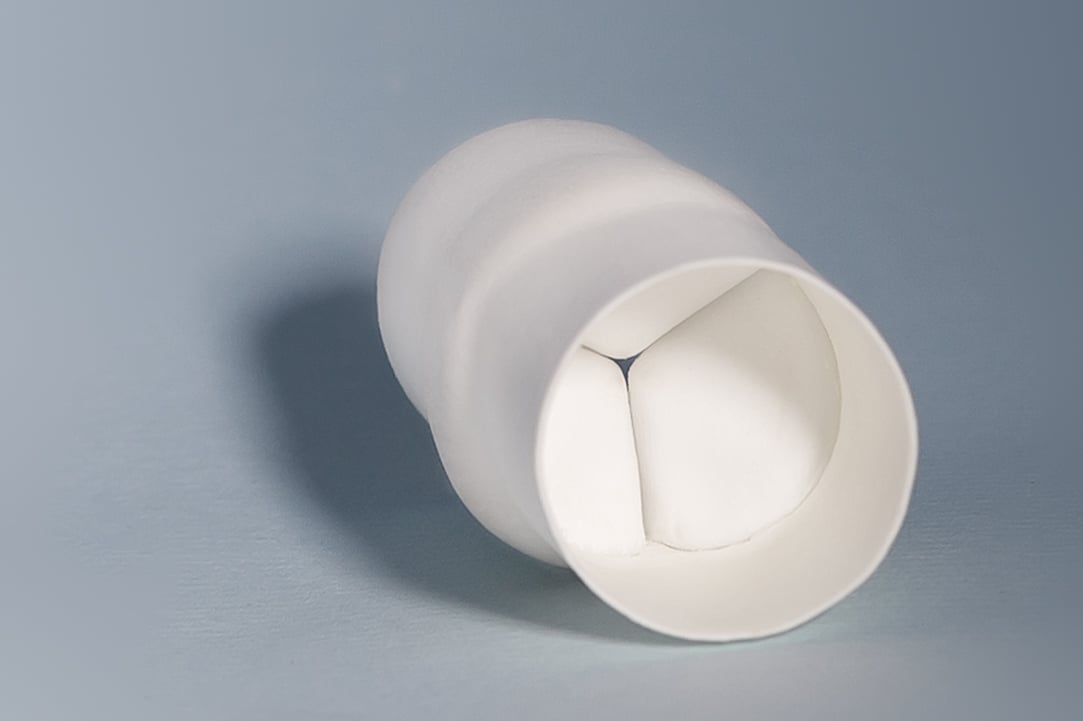
The Xeltis synthetic polymer restorative pulmonary valve is implanted surgically and acts as a scaffold for the patient's own cells to proliferate. The valve and conduit then bioresorbs over time, leaving behind a new valve made from the patient's own cells. The hope is this will reduce or eliminate the need for numerous repeat surgeries as a pediatric patient grows.
July 8, 2021 – Xeltis announced it started the first pivotal trial for a synthetic polymer restorative pulmonary valve, the global, FDA-approved Xplore2/Pivotal study. Following implantation, the valves evolve into fully functioning, natural heart valves through colonization by the patient’s own tissue.
The implants’ porous micro-structure enables the patient’s own tissue to populate it and naturally form a new heart valve that takes over functionality over time. Meanwhile, the original synthetic structure, made from electrospun polymers, resorbs into the body.
Currently, pediatric patients requiring right ventricular outflow tract (RVOT) reconstruction to correct certain congenital heart defects may need several series over their lifetime to implant larger synthetic valves as the patient grows, or when the bioprosthesis leaflets wear out.
 The Xeltis device has been successfully implanted as part of the global, FDA-approved Xplore2/Pivotal study.
The Xeltis device has been successfully implanted as part of the global, FDA-approved Xplore2/Pivotal study.
“Regenerating living heart valves in patients requiring RVOT reconstruction may substantially change their quality of life,” said David Morales, M.D., director, congenital heart surgery, Cincinnati Children’s Hospital and professor, Department of Pediatrics at University of Cincinnati, who is global principal investigator of the trial. “A device that has longer life-span and that potentially grows with the patient would reduce repeated interventions and the physical and psychological burden associated to them.”
Xplore2/Pivotal is a prospective, non-randomized clinical study to assess safety and efficacy of the restorative pulmonary valve in up to 50 patients undergoing RVOT reconstruction. The U.S. FDA-approved investigational device exemption (IDE) trial will be conducted in up to 15 centers in the U.S., Europe and Asia. The implanted patients will be followed-up for five years.
“Data from 18 patients implanted with the Xeltis restorative pulmonary valve as part of other ongoing clinical trials are very promising,” said Professor Tomasz Mroczek, cardio-thoracic surgeon at the Polish-American Children's Hospital in Krakow, Poland. Mroczek implanted the first patient of the Xplore2/Pivotal trial and had also previously implanted three pediatric patients as part of the ongoing Xplore-1 study for the Xeltis pulmonary valve. “The positive safety profile and performance seen in over 60 patient-years of follow-up provide strong indication of a potential best-in-class device to reduce re-operations and improve lives for patients.”
The two-year results from the Xplore-1 trial conducted in 12 patients in Europe and Asia and the one-year data from the U.S. FDA-approved Early Feasibility Study (EFS) Xplore-2 in six patients have been recently published in the peer-reviewed journal Frontiers in Cardiovascular Medicine.[1] Further outcomes from patients up to four years post-surgery confirm consistently low repeat re-intervention rates and offer promising signs of the technology’s superior potential.[2]
“The Xeltis pulmonary heart valve is the most advanced heart valve with regenerative properties based only on a biocompatible synthetic structure and the first ever synthetic restorative valve to enter a pivotal trial,” said Eliane Schutte, Xeltis CEO. “We are extremely proud of our clinical program progression, which also includes two small diameter blood vessel applications. All our regenerative devices promise to offer solutions that overcome the limitations of existing technologies – or the complete lack of them.”
In addition to its restorative pulmonary valve, Xeltis has developed the first restorative synthetic coronary artery bypass graft (CABG). This has shown successful long-term results in long preclinical trials and the first-ever restorative synthetic vascular access graft for patients that need dialysis.[1]
The Need for Congenital Heart RVOT Reconstruction
One in 100 babies are born with a heart defect in the USA.[3,4] Congenital heart disease (CHD) is the most common type of birth defects,[5] of which 15-20 percent generally affect the right ventricular outflow tract (RVOT).[2] These defects reduce or stop the blood flowing to the pulmonary arteries and include severe conditions, such as tetralogy of Fallot, truncus arteriosus, pulmonary atresia, transposition of great arteries and pulmonary stenosis. Defective RVOTs require an open-heart surgical intervention called RVOT reconstruction, which normally involves the replacement of the pulmonary valve.
Xeltis Cardiovascular Restoration
Currently available options for heart valve replacement are either short-lived or may need long-term medication.[6,7] Xeltis’ devices naturally evolve into living heart valves within the body, through colonization by patient’s own tissue to overcome the limitation of existing options. This therapeutic process is called endogenous tissue restoration (ETR). With ETR, the Xeltis heart valve works like a home for patient’s tissue that develops as part of natural healing. The new tissue turns the device into a new, living and fully functional heart valve. As the new living valve takes over functionality, the original synthetic structure gradually absorbs within the body.
About the Xplore2/Pivotal Trial
Xplore2/Pivotal is an FDA-approved prospective, non-randomized, open label clinical study of Xeltis’ restorative pulmonary heart valve in patients requiring right ventricular outflow tract (RVOT) reconstruction. The trial will enroll up to 50 patients aged 2-22 years in up to 15 sites in U.S., Europe and Asia, which currently include: Cincinnati Children’s Hospital, Cincinnati (OH); University of Texas Southwestern Medical Center, Dallas (TX); Children’s Hospital Colorado, Aurora (CO); Children’s Hospital Los Angeles (CA); University Children’s Hospital, Krakow (Poland); National Cardiology Hospital Sofia(Bulgaria); National Heart Institute, Kuala Lumpur (Malaysia).
For more information: www.xplore2MD.com, www.clinicaltrials.gov/ct2/show/NCT03022708?term=NCT03022708&draw=2&rank=1
Related Xeltis Content:
VIDEO: How the Xeltis Bioresorbable Pulmonary Valve Works
Two-Year Xeltis Bioabsorbable Valve Data Shows Positive Functionality
First Bioresorbable Heart Valves Implanted to Enable Cardiovascular Restoration
First Clinical Use of Bioabsorbable Vascular Grafts in Children Shows Promise
Find more new on congenital heart technologies
Find more news on heart valve technologies
References:
2. Xeltis data on file


 January 05, 2026
January 05, 2026 









